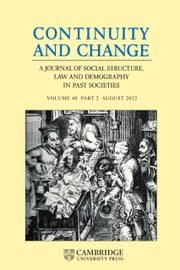Article contents
Towards a better understanding of past fertility regimes: the ideas and practice of controlling family size in Chinese history
Published online by Cambridge University Press: 10 May 2006
Abstract
Thanks to the progress that has been made in the study of population history, it has been gradually accepted that fertility in historical China was only moderate in comparison with the recorded high fertility. However, scholars still disagree on whether the Chinese could have intentionally controlled their family size. This article first summarizes recent findings about fertility patterns in historical China. Then the author provides further evidence of people limiting their family size in the past, before discussing the impact of traditional beliefs on people's fertility behaviour and summarizing the antinatalist ideas and suggestions put forwarded by Chinese officials and intellectuals over China's long history. This evidence is then used to comment on a number of suggestions that have been made about China's traditional reproductive behaviour and culture. The article challenges the views that people's reproductive strategies aimed in the past to maximize the number of surviving offspring and that the demand for children (or sons) was always high in historical China.
- Type
- Research Article
- Information
- Copyright
- © 2006 Cambridge University Press
- 13
- Cited by


